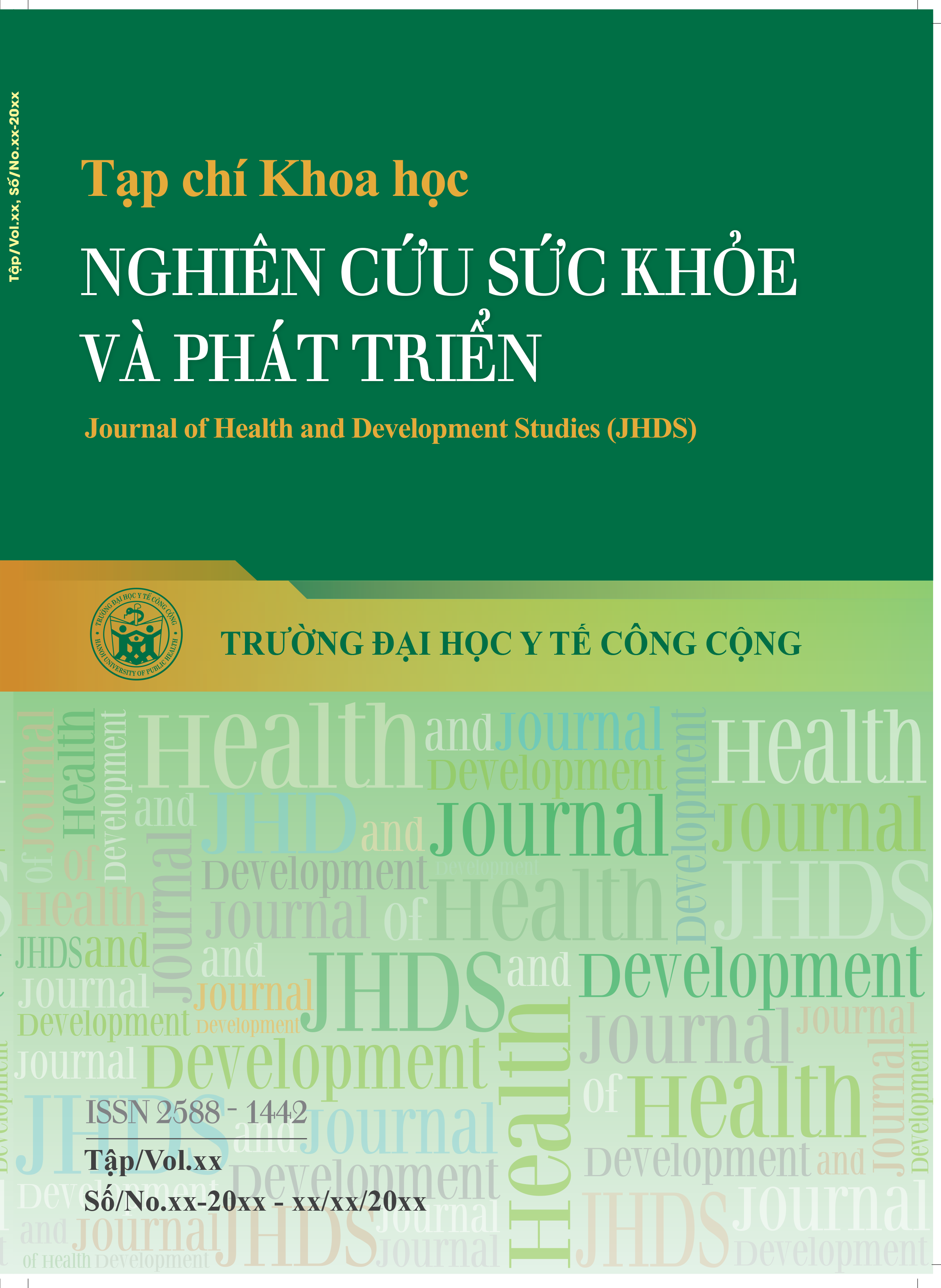Tạp chí
Khoa học Nghiên cứu Sức khỏe và Phát triển
(Journal of Health and Development Studies – JHDS)
Trường Đại học Y tế công cộng
ISSN (Print): 2588-1442
ISSN (Online): XXXX-XXXX
https://jhds.edu.vn
Job demand and control among clinical nurses in a provincial hospital and related factors: Results from a cross-sectional study in 2020.
- Mã bài báo : SKPT_20_098
- Ngày xuất bản : 26/03/2021
- Số trang : 20-30
- Tác giả : Tran Thi Thu Thuy
- Lượt xem : ( 931 )
Danh sách tác giả (*)
- Tran Thi Thu Thuy 1 - Hanoi University of Public Health
- Nguyen Thi Huong 1 - Hoa Binh provincial hospital
- Nguyen Van Bang 2 - Vietnam Military Medical University
- Le Thi Thanh Xuan 3 - Hanoi Medical University
Objective: This study aimed to examine the psychological work environments and associated factors among clinical nurses in a provincial tertiary hospital in the North of Vietnam in 2020.
Methods: A cross-sectional survey was conducted among all nurses of 22 clinical wards who directly provided care to patients. 261/318 eligible nurses returned the self-reported survey questionnaires that consisted of the Vietnamese version of the Job Content Questionnaire 22 items and originally developed questions on personal characteristics and work conditions. Descriptive analysis, t-test, ANOVA, and multivariate linear regressions were applied to describe the current job demand, job control, and related factors at the significant level p less than 0.05.
Results: The response rate of the current study was 82.1%. Nurses reported moderate job demand (29.39±3.64) and job control (66.86±5.79). Increased job control was significantly associated with more frequency of receiving support from superiors (p<0.001), a self-perceived opportunity of promotion (p = 0.011), and more night shifts per week (p=0.004). Less support from co-workers and more night shifts were associated with a higher job demand score among study participants (p = 0.041 and 0.002, respectively).
Conclusions: Several nurses in the provincial hospital work in unfavorable work environments with high job demand and low job control, which could adversely affect nurses’ well-being. It is essential to promote social support at work to improve the psychological working conditions and performance of study participants.
- DOI : https://doi.org/10.38148/JHDS.0502SKPT20-098
- Chủ đề :
- Loại bài báo : Nghiên cứu gốc
- Chuyên nghành : Chuyên Ngành Y
 Thông tin liên hệ : Tran Thi Thu Thuy
Thông tin liên hệ : Tran Thi Thu Thuy Email : tttt@huph.edu.vn
Email : tttt@huph.edu.vn Địa chỉ : Hanoi University of Public Health
Địa chỉ : Hanoi University of Public Health
Bài báo liên quan
- The prevalence of stress-related covid19 quarantine among secondary-and-highschool students in northern Vietnam
- The relationship between T-CD4 recovery and HIV disclosure status among HIV-infected patients on first-line antiretroviral therapy at the Hospital for Tropical Diseases in Ho Chi Minh City
- The cost of HIV testing at five district health facilities intervented poct model to confirmation HIV detected
- Commentary: A Significant Transition of Mode of Teaching and Studying to meet the Covid-19 challenges in an university in Vietnam
- Information searching behaviors among Vietnamese students during first wave of the COVID-19 pandemic
- Health care seeking behaviuor among the elderly in Hue City
- Key breeding sites of Aedes mosquitoes in Huaylau village, Pakse city, Champasack province, Lao People Democratic Republic 2019
- Cost-effectiveness of interventions for people with dementia without caregiver: A Systematic Review
- Sleep quality among youngster in Danang city, Vietnam: A cross-sectional study
- Job demand and control among clinical nurses in a provincial hospital and related factors: Results from a cross-sectional study in 2020.
- The association between smoking status and tobacco outlets density and proximity: A cross-sectional study with geographical data from CHILILAB, 2016
Bài viết mới nhất
- Một số trang web hữu ích đối với các nhà khoa học
- Dành cho chuyên gia
- Tạp chí Khoa học Nghiên cứu sức khỏe và Phát triển duyệt tối đa 1,0 điểm ngành Y trong Danh mục Tạp chí khoa học được tính điểm của Hội đồng giáo sư Nhà nước
- CHÚC MỪNG NGÀY BÁO CHÍ CÁCH MẠNG VIỆT NAM (21/6)
- GS.TS Hoàng Văn Minh - Hiệu trưởng Nhà trường 'lọt top' nhà khoa học có chỉ số trích dẫn hàng đầu thế giới

 File toàn văn
File toàn văn